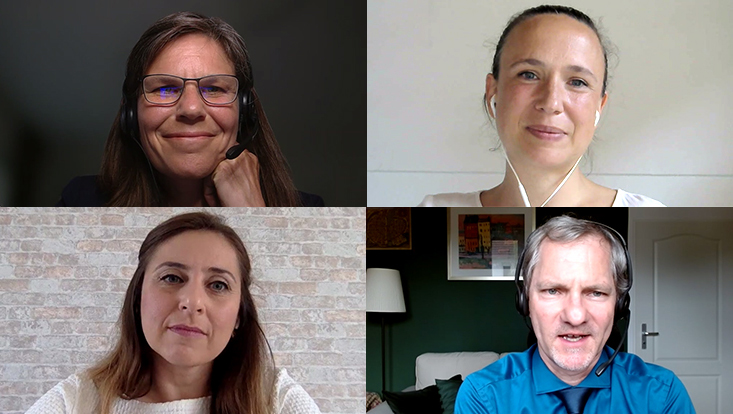Download graphic recording [JPEG]
Cosmopolitan academia?
For many German researchers, going abroad is a simple matter thanks to opportunities such as DAAD funding and the Erasmus program. On the other hand, the DAAD annual study Wissenschaft Weltoffen (cosmopolitan academia) reveals that researchers from other countries do not have long-term prospects in the German academic system. The sociologist Dr. Başak Bilecen from the University of Groningen conducts intensive research on student mobility and took a glance at her current study: while 12.7 percent of the staff at German universities is international, only 7.7 percent are working as professors and 66 percent of these are from western Europe. From a global perspective, academic mobility is uneven.
Mobility is not always the goal
Dr. Valerie Liebs agrees. She points to a lack of financial and infrastructural opportunities in many countries. However, an international career is not necessarily everyone’s goal: The funding campaign Knowledge for Tomorrow—Cooperative Research Projects in Sub-Saharan Africa, which is being offered by the Volkswagen Foundation and which Dr. Liebs was recently involved in, enabled funded researchers to stay in their countries of origin. The project helps them pursue their research at home while also being able to access international networks. At an individual level, this is an opportunity that also prevents brain drain and the associated negative consequences for the researcher’s home country.
Entering German academia
With regard to German academia, Dr. Muriel Helbig, vice president of the DAAD and president of TH Lübeck, emphasized the duties of universities and funding organizations, which she said include facilitating access for international researchers. In the first place, she continued, knowledge of career paths in the German system must be made transparent and concrete support services as well as administrative support and language courses for newly appointed professors must be offered. This is the only way, she concluded, that international recruitment can succeed. And Germans who have spent a long time abroad can also face challenges when they come back. Building stable networks “at home” during one’s absence—all guests agreed—is extremely important.
International experience is more than just mobility
One of the threads of the evening’s discussion was how “international experience” is defined and how doctoral and early career researchers can gain international skills and indicate these in their CVs. “Internationalization is so much more than mobility,” said Dr. Muriel Helbig. “Not everyone can be mobile and not everyone wants to be mobile but you can still have some kind of internationalization in your CV, in your career, and that’s also valuable.” Many academic activities during the doctoral or postdoctoral phase can also be conceived internationally—without going abroad.





